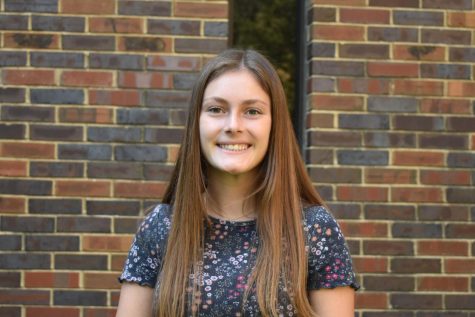Making connections between the past and modern times, English teacher Erin Fluchel’s students compare Edgar Allen Poe’s, “The Masque of the Red Death,” to the current Coronavirus pandemic. Offered as an extra credit opportunity, Fluchel’s Honors English II and English III students were tasked with analyzing Poe’s short story to dig deeper into the social effects of COVID-19.
“I knew I wanted to open this up to kids in my class as an opportunity to think about how literature and current events can intersect,” Fluchel said. “I hoped that students could see that literature, even things written long ago, can still have meaning in our lives today.”
After completing the assignment, sophomore Zeina Daboul recognized many parallels between “The Masque of the Red Death” and current events.
“The story portrays a carelessness which we are exhibiting in our world today. Many people acknowledge social inequalities, the coronavirus, etc. Despite that, they often don’t do anything to address it,” Daboul said. “A poor person today is having to deal with problems beyond their financial state. They’re having to suffer because they can’t get the right education, can’t secure proper healthcare, can’t even be employed in a high paying job.”
Sophomore Taylor Burns feels that she learned more about empathy from the assignment.
“We are taking measures to prevent the spread of corona–that doesn’t mean it won’t affect us. If everyone tried to ignore pandemics or other worldwide challenges, there would be no hope or chance of improvement,” Burns said. “It’s during times like these, when so many people are experiencing setbacks, that we need to set aside our differences and show some empathy.”
Fluchel believes it is important for students to think critically about the coronavirus.
“We are living history, always, but particularly in this moment. I think it’s essential for kids to think about what is happening right now and what their role in it all is,” Fluchel said. “I don’t believe it’s my role to ‘preach’ my values to kids but rather to encourage discourse that lets them think critically about the world in which we live and to discover how to positively impact it as well.”


![Annotating her copy of the short story, sophomore Zeina Daboul works on her assignment. Daboul found the parallels between the story and modern times interesting. “When you look deeper [into the story], you can see that it reflects our society, in ways that you wouldn't think a story written in 1842 would,” Daboul said.](https://pwestpathfinder.com/wp-content/uploads/2020/04/20200406_2316051-900x709.jpg)

![Smiling in a sea of Longhorns, Fox 2 reporter Ty Hawkins joins junior Darren Young during the morning Oct. 3 pep rally. The last time West was featured in this segment was 2011. “[I hope people see this and think] if you come to [Parkway] West, you will have the time of your life because there are so many fun activities to do that make it feel like you belong here. I was surprised so many people attended, but it was a lot of fun,” Young said.](https://pwestpathfinder.com/wp-content/uploads/2025/10/Edited2-1200x798.jpg)
![West High seniors and families listen as a representative of The Scholarship Foundation of St. Louis, Teresa Steinkamp, leads a Free Application for Federal Student Aid (FAFSA) workshop. This session, held in the library, provided guidance on financial aid, scholarships and student loan options. “This event is very beneficial for any seniors who are applying to or considering applying to colleges after high school [because] the cost of college is on the rise for seniors and parents,” college and career counselor Chris Lorenz said.](https://pwestpathfinder.com/wp-content/uploads/2025/09/DSC_4478-1200x778.jpg)
![Senior Kamori Berry walks across the field during halftime at the Homecoming football game on Sept. 12. During the pep assembly earlier that day, she was pronounced Homecoming Queen. “I thought it was nice that the crowd [started] cheering right away. I know [my friends] were really excited for me, and my family was happy because typically non-white people don't win,” Berry said.](https://pwestpathfinder.com/wp-content/uploads/2025/09/DSC7046-Enhanced-NR-1200x798.jpg)



![Pitching the ball on Apr. 14, senior Henry Wild and his team play against Belleville East. Wild was named scholar athlete of the year by St. Louis Post-Dispatch after maintaining a high cumulative GPA and staying involved with athletics for all of high school. “It’s an amazing honor. I feel very blessed to have the opportunity to represent my school [and] what [it] stands for,” Wild said.](https://pwestpathfinder.com/wp-content/uploads/2025/05/unnamed-6-1200x714.jpg)
![The Glory of Missouri award recipients stand with their certificates after finding out which virtue they were chosen to represent. When discovering their virtues, some recipients were met with contented confirmation, while others, complete surprise. “I was not at all surprised to get Truth. I discussed that with some of the other people who were getting the awards as well, and that came up as something I might get. Being in journalism, [Fellowship of Christian Athletes and] Speech and Debate, there's a culture of really caring about truth as a principle that I've tried to contribute to as well. I was very glad; [Truth] was a great one to get,” senior Will Gonsior said.](https://pwestpathfinder.com/wp-content/uploads/2025/04/Group-Glory-of-Missouri.jpg)

